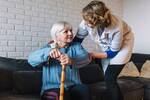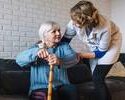
12 May The Ultimate Guide to In-Home Senior Care
Supporting a family member to age comfortably at home can range from regular check-ins at a parent’s place to aiding a partner in daily tasks like bathing and cooking, along with managing medications and giving injections. No matter the extent of your assistance, the following suggestions can enable your loved one to stay at home comfortably for as long as possible.
Create a plan
Balancing immediate needs with future considerations is crucial. Managing day-to-day tasks alongside medical appointments and medication renewals is essential, all while considering potential challenges related to your loved one’s health and age. While you can’t predict everything, proactive planning allows for better emergency responses. Don’t handle it solo; create a support network with family and friends.
- Identify responsibilities and reach agreement. Inquire about each team member’s willingness to aid in the person’s care. Even those at a distance can manage tasks like bill payments, medication orders, and arranging medical appointments. Collaborate on a strategy with them.
- Assess your own capabilities honestly. Determine what tasks you’re comfortable handling. If direct caregiving makes you uneasy, such as assisting with bathing, explore if another team member can take over or discuss the possibility of hiring professional help.
- Document the plan comprehensively. Having a written plan ensures clarity among all team members, including the care recipient, thereby minimizing confusion. Keep in mind that the plan may need adjustments over time; update it accordingly.
Make Your Home Senior-Safe

freepik image
Seniors frequently experience injuries from falls, with home environments being the primary site of occurrence. These incidents often result from a combination of environmental dangers and age-related issues like compromised balance and vision. The repercussions of such falls can be severe, including fractures, immobility, and dependency, particularly for individuals with conditions like osteopenia or osteoporosis. Therefore, it’s crucial to prioritize creating a safe environment for elderly family members at home. What may seem simple to a younger individual can present significant challenges to an older adult, necessitating a thorough assessment of potential hazards from their perspective. Here are key considerations for enhancing safety in a senior’s residence:
- Slip-resistant measures for bathrooms and toilets: These areas often contribute to falls, so ensure grab bars are in place, apply slip-resistant treatments to flooring, use non-skid mats, and maintain dry floors. Patient lifts are essential for those with mobility issues.
- Surface organization: Conceal loose wires, secure carpets, minimize furniture and decorations, and keep countertops clear, holding only essential items.
- Improving steps and entrances: Ensure entrances are spacious and steps are manageable; consider adding ramps if needed.
- Ample illumination: Open curtains for natural light, install lighting in dim areas, and opt for motion-activated lights to aid seniors’ movement.
- Comfortable seating and bedding: Select options with suitable heights to prevent discomfort for seniors.
- Proper footwear fit: Avoid ill-fitting shoes to reduce instability and the risk of falls.
Individuals with Alzheimer’s or dementia often encounter specific safety hurdles due to their declining cognitive abilities, in addition to the general home safety measures outlined above.
Handle health care requirements
Supporting an aging or long-term unwell family member may involve administering basic medical duties and managing a complex array of medications for various conditions. The crucial aspect is staying organized and understanding how to access the assistance you require.
- Stay vigilant with medication management. Develop and maintain an updated list of medications detailing the name, dosage, prescribing physician, and other pertinent details—a useful resource for medical consultations.
- Prepare for medical responsibilities. Following a loved one’s hospitalization, many caregivers find themselves tackling demanding tasks at home, like administering injections and inserting catheters. Obtain thorough guidance and even a practical demonstration of essential procedures prior to discharge from the hospital.
- Arrange for home healthcare services. Medicare extends coverage for certain medically necessary in-home services, including part-time or intermittent skilled nursing care, as well as physical, occupational, or speech therapy. Patients who meet the criteria for being homebound or unable to attend office visits may qualify for ongoing provision of these services.
Keep the lifestyle healthy
Providing care can take over your life, especially when you live with the person you’re looking after. You might end up being their nurse, mentor, dietary expert, and event planner. These roles are crucial for keeping your loved one well but remember to take care of yourself too.
- Attend to interpersonal needs. Supporting social connections is vital for well-being; combating isolation and fostering companionship is essential in caregiving. Explore local arts initiatives for seniors, arrange gatherings with friends and family, or dine out together.
- Be mindful of any dietary limitations and promote a wholesome diet while discouraging processed foods. Explore meal delivery services, and ensure adequate fluid intake to prevent dehydration.
- Promote physical activity. Encouraging regular movement helps older individuals maintain strength, balance, energy, and cognitive function. Tailor the exercise routine to your loved one’s abilities by consulting a physician as needed, and consider activities such as walking, seated yoga, swimming, or light weightlifting.
- Set boundaries. Respect for privacy is essential, especially when caring for someone in your shared living space. Strive for some separation between living areas and carve out dedicated time for yourself and your partner.
Final Words
Every aspect of attention provided is geared towards enhancing the quality of life for our elderly relatives, enabling them to grow old gracefully and with dignity. By adopting these approaches, we cultivate a nurturing and empathetic atmosphere within our household. Beyond the confines of home, individuals and their loved ones can avail themselves of expert medical and caregiving aid, alongside exploring volunteer programs during challenging times. These combined endeavors establish a robust support system, guaranteeing that our loved ones receive the care they merit during their later years.
The information on MedicalResearch.com is provided for educational purposes only, and is in no way intended to diagnose, cure, or treat any medical or other condition.
Some links may be sponsored. Products are not endorsed.
Always seek the advice of your physician or other qualified health and ask your doctor any questions you may have regarding a medical condition. In addition to all other limitations and disclaimers in this agreement, service provider and its third party providers disclaim any liability or loss in connection with the content provided on this website.
Last Updated on May 12, 2024 by Marie Benz MD FAAD
